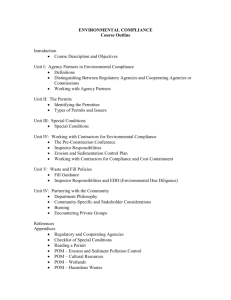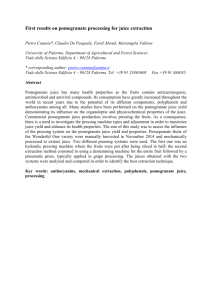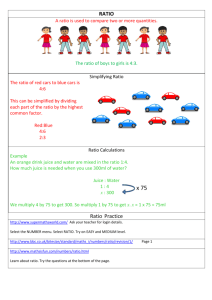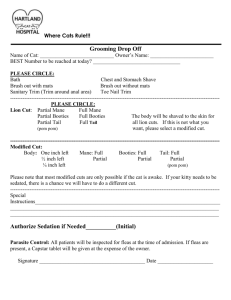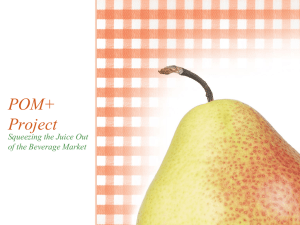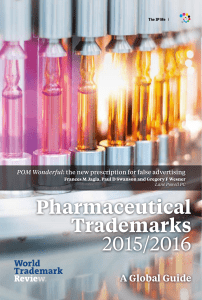P Where’s the Juice?
advertisement
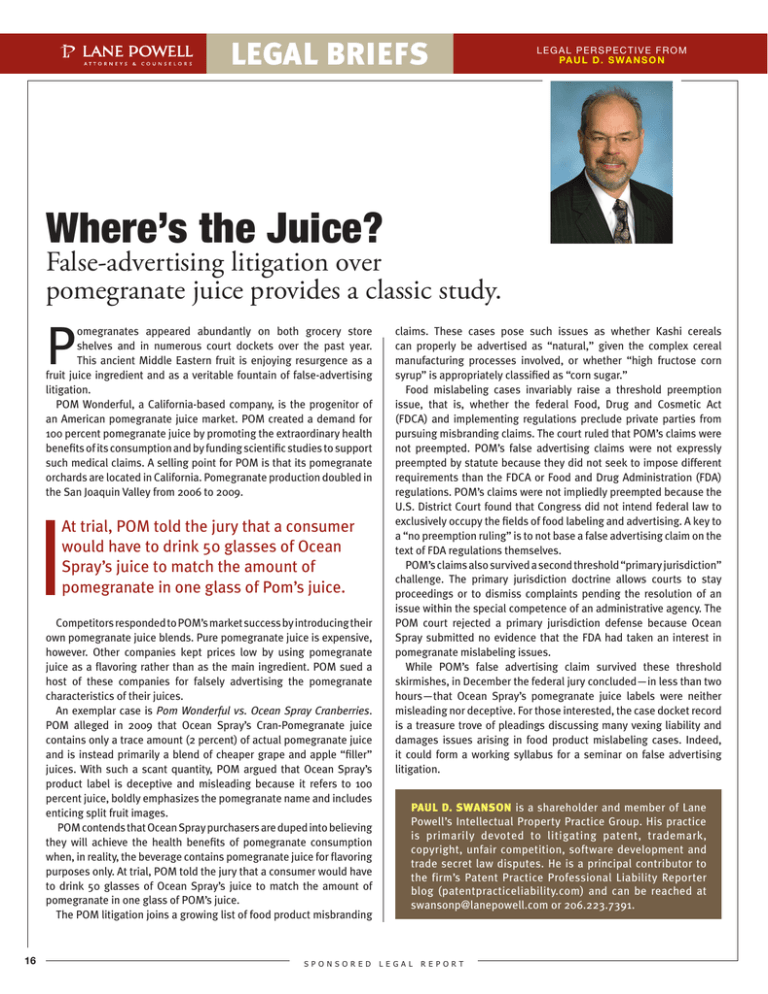
legal briefs legal perspective from pa u l D . s w a n s o n Where’s the Juice? False-advertising litigation over pomegranate juice provides a classic study. P omegranates appeared abundantly on both grocery store shelves and in numerous court dockets over the past year. This ancient Middle Eastern fruit is enjoying resurgence as a fruit juice ingredient and as a veritable fountain of false-advertising litigation. POM Wonderful, a California-based company, is the progenitor of an American pomegranate juice market. POM created a demand for 100 percent pomegranate juice by promoting the extraordinary health benefits of its consumption and by funding scientific studies to support such medical claims. A selling point for POM is that its pomegranate orchards are located in California. Pomegranate production doubled in the San Joaquin Valley from 2006 to 2009. At trial, POM told the jury that a consumer would have to drink 50 glasses of Ocean Spray’s juice to match the amount of pomegranate in one glass of Pom’s juice. Competitors responded to POM’s market success by introducing their own pomegranate juice blends. Pure pomegranate juice is expensive, however. Other companies kept prices low by using pomegranate juice as a flavoring rather than as the main ingredient. POM sued a host of these companies for falsely advertising the pomegranate characteristics of their juices. An exemplar case is Pom Wonderful vs. Ocean Spray Cranberries. POM alleged in 2009 that Ocean Spray’s Cran-Pomegranate juice contains only a trace amount (2 percent) of actual pomegranate juice and is instead primarily a blend of cheaper grape and apple “filler” juices. With such a scant quantity, POM argued that Ocean Spray’s product label is deceptive and misleading because it refers to 100 percent juice, boldly emphasizes the pomegranate name and includes enticing split fruit images. POM contends that Ocean Spray purchasers are duped into believing they will achieve the health benefits of pomegranate consumption when, in reality, the beverage contains pomegranate juice for flavoring purposes only. At trial, POM told the jury that a consumer would have to drink 50 glasses of Ocean Spray’s juice to match the amount of pomegranate in one glass of POM’s juice. The POM litigation joins a growing list of food product misbranding 16 Sponsored claims. These cases pose such issues as whether Kashi cereals can properly be advertised as “natural,” given the complex cereal manufacturing processes involved, or whether “high fructose corn syrup” is appropriately classified as “corn sugar.” Food mislabeling cases invariably raise a threshold preemption issue, that is, whether the federal Food, Drug and Cosmetic Act (FDCA) and implementing regulations preclude private parties from pursuing misbranding claims. The court ruled that POM’s claims were not preempted. POM’s false advertising claims were not expressly preempted by statute because they did not seek to impose different requirements than the FDCA or Food and Drug Administration (FDA) regulations. POM’s claims were not impliedly preempted because the U.S. District Court found that Congress did not intend federal law to exclusively occupy the fields of food labeling and advertising. A key to a “no preemption ruling” is to not base a false advertising claim on the text of FDA regulations themselves. POM’s claims also survived a second threshold “primary jurisdiction” challenge. The primary jurisdiction doctrine allows courts to stay proceedings or to dismiss complaints pending the resolution of an issue within the special competence of an administrative agency. The POM court rejected a primary jurisdiction defense because Ocean Spray submitted no evidence that the FDA had taken an interest in pomegranate mislabeling issues. While POM’s false advertising claim survived these threshold skirmishes, in December the federal jury concluded—in less than two hours—that Ocean Spray’s pomegranate juice labels were neither misleading nor deceptive. For those interested, the case docket record is a treasure trove of pleadings discussing many vexing liability and damages issues arising in food product mislabeling cases. Indeed, it could form a working syllabus for a seminar on false advertising litigation. paul d. swanson is a shareholder and member of Lane Powell’s Intellectual Property Practice Group. His practice is primarily devoted to litigating patent, trademark, copyright, unfair competition, software development and trade secret law disputes. He is a principal contributor to the firm’s Patent Practice Professional Liability Reporter blog (patentpracticeliability.com) and can be reached at swansonp@lanepowell.com or 206.223.7391. Legal Report

